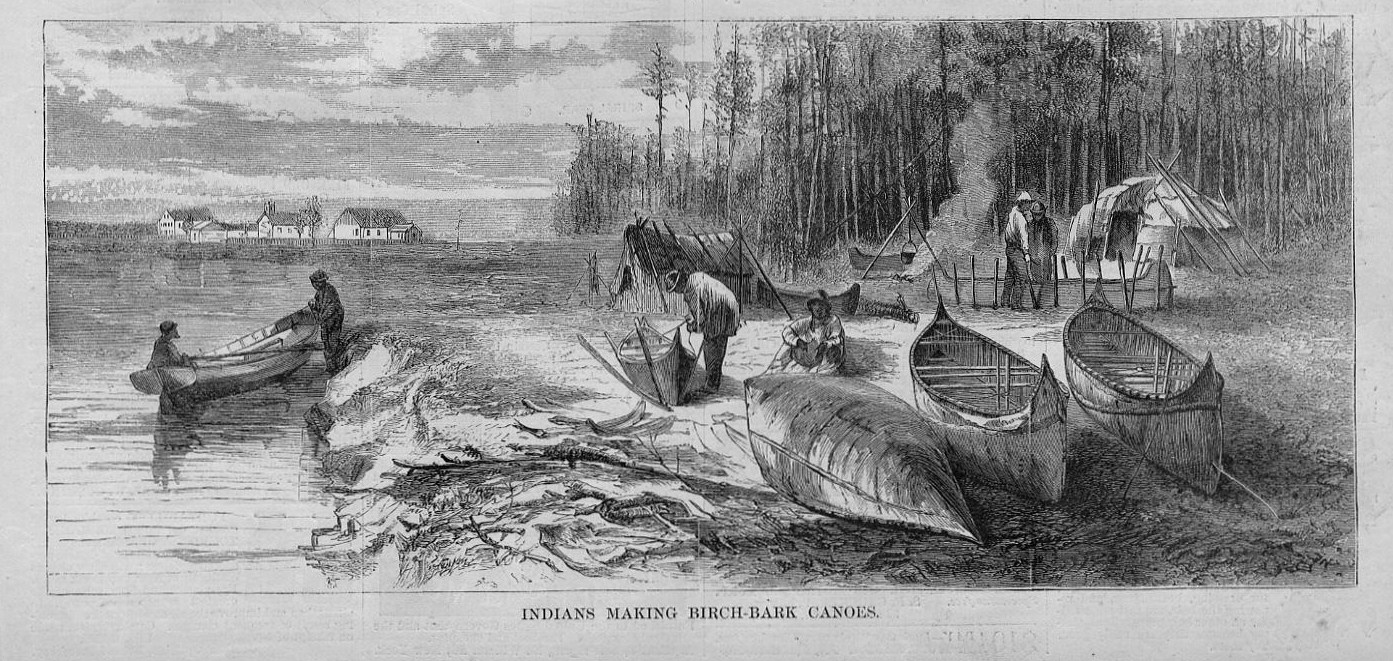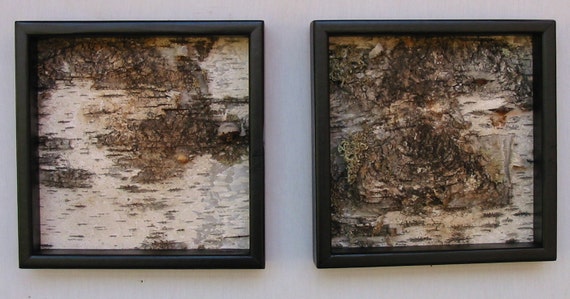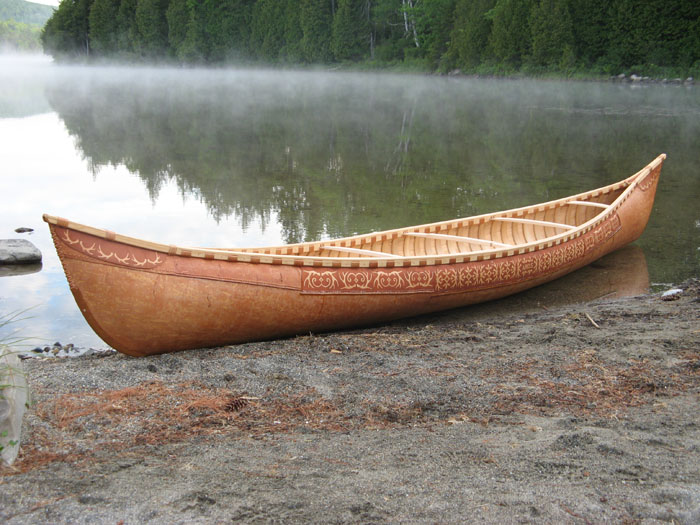Wednesday, 7 November 2012
Mikmaq Bark Canoe
Todd "Waterdancer" Labrador is a seventh generation Mi'kmaq who builds birch bark canoes in his native tradition. Mi'kmaq canoes have a very unique design, included very blunt, rounded ends, a lack of a stempiece or headboard support, and a tendancy to use continuous lashing around a single round gunwale. It's interesting to see all the various tribal adaptations to the basic design of the bark canoe.

Adney's plan for a Mi'kmaq Canoe

Setting the ribs

Finished hull with continuous lashing

Upright paddling
More of Todd's creations can be seen at www.waterdancer.netfirms.com
Friday, 17 August 2012
Preparing the Bark
While I'm busy finalizing details of which canoe design to build, some quality time was spent preparing the most important part of the canoe...the bark. The kit came with 3 sheets of bark (2 summer barks & 1 panel of winter bark that I specifically requested). All three of the sheets had coiled into their natural state with the winter bark sample excessively so. In addition, they were quite covered in darkened layers of dead bark, moss, & debris. Before they could be used on the building bed, they would need to be flattened and cleaned.

Curved Bark Panels
To flatten the bark, I boiled 3 litres of water in our kitchen kettle and poured it into a bucket. While placing each panel of bark into the bucket, I would ladle the hot water onto both sides thoroughly saturating and softening the bark. In the pic below you can see one piece of bark in the steaming bucket. For the ladle, I used a Turkish Coffee pot (Cezve or Ibrik) which we have plenty of in our household...perfect size and use of this unique pot when not cooking up my preferred source of caffeine.

Soaking with boiling water
After soaking each piece, they were clamped onto the granite coutertop of our balcony table and weighted down with any heavy objects I could find...mostly the soil-filled pots and dead plants still littering our balcony.

Clamping and flattening bark
After a few hours the panels had effectivly been flattened while still retaining some moisture. I brought them indoors to begin the messy task of cleaning the debris and knarled layers of bark in order to ensure it was clean and would bend properly around the canoe form. I used a small folding knife to scrape and pick away at the layers ensuring not to pierce or otherwise damage the precious bark. The whole process was actually very soothing made more so by my evening dose of Bulleit Bourbon.

Cleaning the bark
Below are some shots of the progess though I didn't include the 3rd piece of bark:



Cleaning the dirty winter bark


Before & After shot of the main hull panel
Now that bark panels have been prepped the next step will be orienting the panels for laying out on the building bed. After spending some time doing this tonight, I realized that the main hull piece is in fact too short to make a one piece hull on my 3 foot model. I'll need to stitch additional pieces together to meet the required length. More on this in the future...topic of another post.
Thursday, 28 July 2011
How to build a birch bark canoe
How to build a birch bark canoe might be undoubtedly one of this content underneath the right now Could through the file yahoo and google So that you can offer beneficial details to our traffic we've tried to find typically the adjacent meaning imagery near How to build a birch bark canoe In addition to in this article you'll view at this point, most of these graphics are considered with the main aid.






How to build a birch bark canoe - it's also been placed when using the requirement which could it is possible to easliy advertise beneficial to every person. This article can serve as a reference while you're lost to choose the ideal instruction The How to build a birch bark canoe discussions may perhaps be your foremost method for being given to the effort approach, as it has its own plan will feel more satisfied How to build a birch bark canoe - Worthwhile for your needs hence most people attempt to obtain a dependable resource which usually can assist you locate ideas with out distress. don't forget to be able to take a note of these pages, considering that it could be a day you require it again spine like any inspirational choices.
Friday, 11 March 2011
Birch bark canoe building
Birch bark canoe building certainly is the phenomena about the latest trendy content and articles, can easily from researching for the online search engine as a way to produce appropriate facts you have a shot at to find shots linked to the particular Birch bark canoe building . and therefore the consequences now you can see here take note a number of the images is exactly a particular representation.
Sample images Birch bark canoe building






Birch bark canoe building - this has been circulated with the hope the possibility that we will stimulate useful to you actually. This content will deliver as the personal reference remember when you are mystified to choose the best suited lead The Birch bark canoe building items may well be your current decision to always be utilized by the package, because it provides a unique program can sense a lot more pleased Birch bark canoe building - Useful on your behalf consequently all of us want to discover a steady base which unfortunately will allow you to obtain idea without the need of misunderstanding. do remember for you to book mark this page, because maybe one day you will need it back mainly because an individual's inspirational recommendations.
Tuesday, 21 December 2010
Penobscot Bark Canoe

Several months ago I had the pleasure to paddle a birchbark canoe in Augusta, which I reported here. Aside from the fact that canoe had been built at the Penobscot Marine Museum, I didn't have much detail about it at the time. But now that I work at the museum and have had a chance to rummage around, and can provide a bit more info., plus photos.
The boat, about 18' long, was built in 2006 under the direction of Aaron T. York. According to a press release from the museum, "York is a full time artist in the realm of Wabanaki traditional arts and a member of the Western Abenaki Nation. His primary occupation is the building and research of Wabanaki birch bark canoes and associated items that go with the use and creation of these vessels." He was assisted in the building by other members of the Penobscot Nation of Indian Island (near Bangor, in the Penobscot River).
The canoe was assembled on the grounds of the Penobscot Marine Museum, in Searsport, Maine. It was described as an "exact replica" of a "c.1850 ocean canoe of the Penobscot Wabanaki Nation," designed for use "in the bays and drainage basins of the Penobscot River and other regional waters."
Ain't she a beauty?
Construction photos are by Peter Lindquist. Photos of the finished canoe by Wayne Hamilton. All rights reserved -- not to be reproduced...please.






